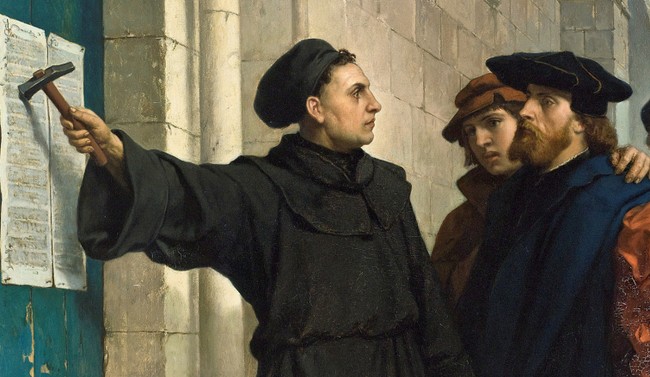We support our Publishers and Content Creators. You can view this story on their website by CLICKING HERE.

October 31 is an important holiday. No, I’m not talking about Halloween, although any holiday that involves eating candy is worth celebrating. Instead, I’m talking about Reformation Day.
Advertisement
On Oct. 31, 1517, Martin Luther nailed his famous 95 Theses to the door of the church in Wittenberg, Germany. It was the culmination of years of wrestling with theology for the law student turned Augustinian monk. That act eventually led to Luther’s excommunication and a new path for believers to worship and pursue theology as they saw fit.
Luther saw a Catholic Church that was desperately in need of reform. The authority of the clergy had taken precedence over scripture, and church leaders kept the Bible out of the language of the people, thus making them dependent on priests to learn what God’s Word said. But the most egregious abuse of power he saw was in the system of indulgences.
“Spiritually earnest people were told to justify themselves by charitable works, pilgrimages, and all kinds of religious performances and devotions,” Justin Holcomb explains at Christianity.com. “They were encouraged to acquire this ‘merit,’ which was at the disposal of the church, by purchasing certificates of indulgence. This left them wondering if they had done or paid enough to appease God’s righteous anger and escape his judgment.”
Not only was this a corrupt and greedy practice, but indulgences also stemmed from a works-based view of salvation — the notion that our contributions to the church would give us better standing in the eyes of God.
Advertisement
“Though preached clearly in the New Testament and found in the writings of many of the church fathers, the medieval bishops and priests had largely forgotten the truth that our own good works can by no means merit God’s favor,” writes Robert Rothwell at Ligonier Ministries. “Salvation is by grace alone through faith alone, and good works result from our faith, they are not added to it as the grounds for our right standing in the Lord’s eyes (Eph. 2:8-10).”
(Side note: I don’t believe that the same corruption that plagued the Roman Catholic Church characterizes today’s church. I have many Catholic friends who are wonderful people of faith, and though we may not agree on everything, I don’t doubt the sincerity of their faith in Jesus.)
Related: On International Religious Freedom Day, Let’s Remember Those Whose Freedom Is in Danger
Could Luther have reformed the Church from within? Possibly, but that’s not the path that God took him down. Instead, he and other reformers discovered a distinct theology that we can sum up in the Five Solas.
Matthew Barrett explains at The Gospel Coalition:
These five statements of the evangelical faith lay at the center of what distinguished the theology of the Reformation from the theology of the Roman Catholic church in the 16th century. Sola scriptura is the belief that because Scripture is God’s inspired Word, it is the only inerrant, sufficient, and final authority for the church. Solus Christus is the assertion that Christ alone is the basis on which the ungodly are justified in God’s sight. Sola fide maintains that the believer receives the redemption Christ has accomplished only through faith. Sola gratia proclaims that all of our salvation, from beginning to end, is by grace and grace alone. Because of these things, the Reformers held fast to the phrase soli Deo gloria, that only God receives glory for our salvation.
Advertisement
While it’s true that the Protestant Reformation split Christians along theological lines, it also led to much more freedom. I don’t know how many denominations there are these days, and there’s no telling how many non-denominational churches are out there. Thanks to Luther and the other reformers, Christians have choices, and as long as they believe in the essentials, this freedom allows them to pursue their relationship with God however they see fit.
Flashback: Why I Am a Non-Denominational Christian
One of Luther’s Ninety-Five Theses simply declares, “The Church’s true treasure is the gospel of Jesus Christ.” That alone is the meaning of Reformation Day. The church had lost sight of the gospel because it had long ago papered over the pages of God’s Word with layer upon layer of tradition. Mere tradition often brings about systems of works, of earning your way back to God. It was true of the Pharisees, and it was true of medieval Roman Catholicism. Didn’t Christ Himself say, “My yoke is easy and My burden is light”? Reformation Day celebrates the joyful beauty of the liberating gospel of Jesus Christ.
What a lovely thought! Today, I remember the reformers, and I’m grateful to them for their work. At the same time, I worship, pray, spread the gospel, and seek to make disciples alongside my Catholic brothers and sisters. After all, we’re still family.
Advertisement

 Conservative
Conservative  Search
Search Trending
Trending Current News
Current News 







